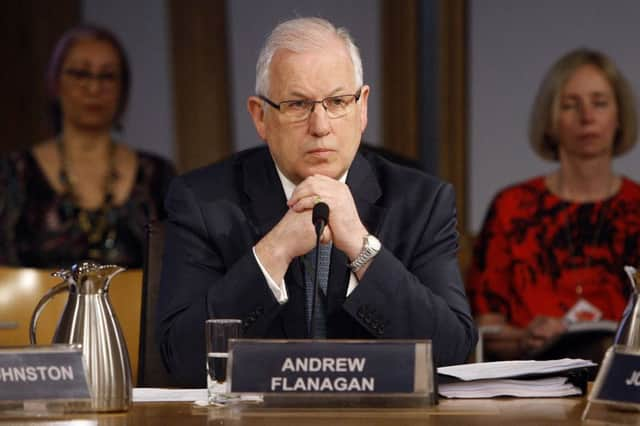Chris Marshall: Police authority's problems run deeper than just Flanagan's leadership


Mr Flanagan has achieved a remarkable feat in almost two years leading the board, taking over an organisation struggling for credibility and managing to reduce its reputation further.
But if the SPA thought Mr Flanagan’s departure would allow it some breathing space, the arrival of a critical inspection report just days later shattered that particular illusion.
Advertisement
Hide AdAdvertisement
Hide AdThe report by HM Inspectorate of Constabulary in Scotland (HMICS) raised concerns about leadership of the organisation and said there was “dysfunction” in the relationship between Mr Flanagan and SPA chief executive John Foley.
Within hours of the report being leaked last week, it was Mr Foley who found himself in the eye of the storm, with what Scottish Labour called “difficult questions” to answer over his role.
Commenting on his report, HM Inspector of Constabulary in Scotland Derek Penman said increasing concerns over the openness and transparency of the SPA had undermined confidence in the organisation and “detracted from its ability to perform its statutory function”.
A further HMICS report, published yesterday, said both the SPA and Police Scotland have failed to deliver on improvements to forensic services with no overall strategy in place for over four years. Again, the leadership of the SPA was questioned.
All this matters because the SPA has an important dual function of overseeing the £1.1 billion Police Scotland budget and holding the chief constable to account.
The constant scrutiny of the SPA and the need for it to defend itself is a distraction from the job the organisation was set up to do.
Now is an important time for the SPA, and it’s crucial it gets the appointment of its new chairman right.
However, it’s also becoming clear the organisation’s problems go beyond the personalities of those in charge.
Advertisement
Hide AdAdvertisement
Hide AdWith confidence in the SPA continuing to falter, urgent action is needed to re-vitalise its staid public board meetings.
At last week’s meeting in Edinburgh, an attempt was made to introduce questions from members of the public which had been submitted in advance. The idea was a good one, but it seems some of the more pointed questions may have been watered down, leaving the whole thing feeling gimmicky.
There also appears to be a collective failure by the board to take seriously the criticism levelled at the SPA by HMICS.
At Thursday’s meeting, discussion of the HMICS report extended only as far as calls for an “inquiry” into how the document came to be leaked to the press, and an admission staff morale had been “badly bruised”.
The board could badly use an injection of fresh ideas and impetus.
The suggestion has previously been made that representatives of staff associations such as the Scottish Police Federation or unions representing civilian police staff could sit on the board.
This seems like one way of revitalising the meetings and increasing overall knowledge of day-to-day policing on the board.
Whatever happens, the SPA must move fast because its continuing drift is damaging not just for itself, but Scottish policing as a whole.